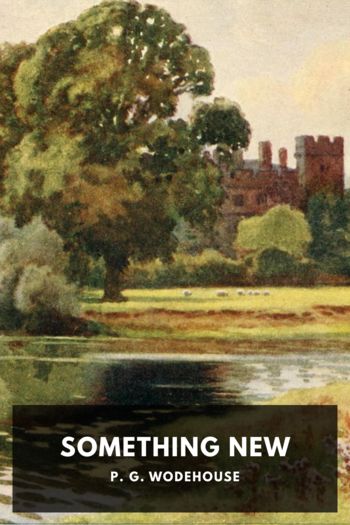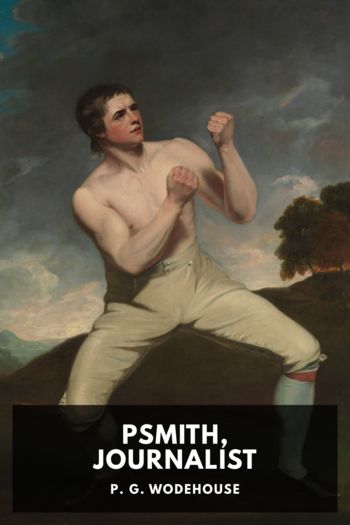Leave It to Psmith - P. G. Wodehouse (i wanna iguana read aloud .TXT) 📗

- Author: P. G. Wodehouse
Book online «Leave It to Psmith - P. G. Wodehouse (i wanna iguana read aloud .TXT) 📗». Author P. G. Wodehouse
“See this?” said Mr. Cootes, exhibiting his revolver.
“I do indeed, Comrade Cootes,” replied Psmith. “And, if it is not an untimely question, what is the idea?”
“That,” said Mr. Cootes, “is just in case you try any funny business.” And, replacing the weapon in a handy pocket, he proceeded to slap vigorously at the region between his shoulder blades. He also wriggled with not a little animation.
Psmith watched these manoeuvres gravely.
“You did not stop me at the pistol’s point merely to watch you go through your Swedish exercises?” he said.
Mr. Cootes paused for an instant.
“Got a beetle or something down my back,” he explained curtly.
“Ah? Then, as you will naturally wish to be alone in such a sad moment, I will be bidding you a cordial good evening and strolling on.”
“No, you don’t!”
“Don’t I?” said Psmith resignedly. “Perhaps you are right, perhaps you are right.” Mr. Cootes replaced the revolver once more. “I take it, then, Comrade Cootes, that you would have speech with me. Carry on, old friend, and get it off your diaphragm. What seems to be on your mind?”
A lucky blow appeared to have stunned Mr. Cootes’s beetle, and he was able to give his full attention to the matter in hand. He stared at Psmith with considerable distaste.
“I’m on to you, Bill!” he said.
“My name is not Bill,” said Psmith.
“No,” snapped Mr. Cootes, his annoyance by this time very manifest. “And it’s not McTodd.”
Psmith looked at his companion thoughtfully. This was an unforeseen complication, and for the moment he would readily have admitted that he saw no way of overcoming it. That the other was in no genial frame of mind towards him the expression on his face would have showed, even if his actions had not been sufficient indication of the fact. Mr. Cootes, having disposed of his beetle and being now at leisure to concentrate his whole attention on Psmith, was eyeing that immaculate young man with a dislike which he did not attempt to conceal.
“Shall we be strolling on?” suggested Psmith. “Walking may assist thought. At the moment I am free to confess that you have opened up a subject which causes me some perplexity. I think, Comrade Cootes, having given the position of affairs a careful examination, that we may say that the next move is with you. What do you propose to do about it?”
“I’d like,” said Mr. Cootes with asperity, “to beat your block off.”
“No doubt. But …”
“I’d like to knock you for a goal!”
Psmith discouraged these Utopian dreams with a deprecating wave of the hand.
“I can readily understand it,” he said courteously. “But, to keep within the sphere of practical politics, what is the actual move which you contemplate? You could expose me, no doubt, to my host, but I cannot see how that would profit you.”
“I know that. But you can remember I’ve got that up my sleeve in case you try any funny business.”
“You persist in harping on that possibility, Comrade Cootes. The idea seems to be an obsession with you. I can assure you that I contemplate no such thing. What, to return to the point, do you intend to do?”
They had reached the broad expanse opposite the front door, where the drive, from being a river, spread out into a lake of gravel. Psmith stopped.
“You’ve got to get me into this joint,” said Mr. Cootes.
“I feared that that was what you were about to suggest. In my peculiar position I have naturally no choice but to endeavour to carry out your wishes. Any attempt not to do so would, I imagine, infallibly strike so keen a critic as yourself as ‘funny business.’ But how can I get you into what you breezily describe as ‘this joint’?”
“You can say I’m a friend of yours and ask them to invite me.”
Psmith shook his head gently.
“Not one of your brightest suggestions, Comrade Cootes. Tactfully refraining from stressing the point that an instant lowering of my prestige would inevitably ensue should it be supposed that you were a friend of mine, I will merely mention that, being myself merely a guest in this stately home of England, I can hardly go about inviting my chums here for indefinite visits. No, we must find another way. … You’re sure you want to stay? Quite so, quite so, I merely asked. … Now, let us think.”
Through the belt of rhododendrons which jutted out from one side of the castle a portly form at this point made itself visible, moving high and disposedly in the direction of the back premises. It was Beach, the butler, returning from the pleasant ramble in which he had indulged himself on the departure of his employer and the rest of the party. Revived by some gracious hours in the open air, Beach was returning to duty. And with the sight of him there came to Psmith a neat solution of the problem confronting him.
“Oh, Beach,” he called.
“Sir?” responded a fruity voice. There was a brief pause while the butler navigated into the open. He removed the straw hat which he had donned for his excursion, and enfolded Psmith in a pop-eyed but not unkindly gaze. A thoughtful critic of country-house humanity, he had long since decided that he approved of Psmith. Since Lady Constance had first begun to offer the hospitality of the castle to the literary and artistic world, he had been profoundly shocked by some of the rare and curious specimens who had nodded their disordered locks and flaunted their ill-cut evening clothes at the dinner-table over which he presided; and Psmith had come as a pleasant surprise.
“Sorry to trouble you, Beach.”
“Not at all, sir.”
“This,” said Psmith, indicating Mr. Cootes, who was viewing the scene with a wary and suspicious eye, an eye obviously alert for any signs of funny business, “is my man. My valet,





Comments (0)